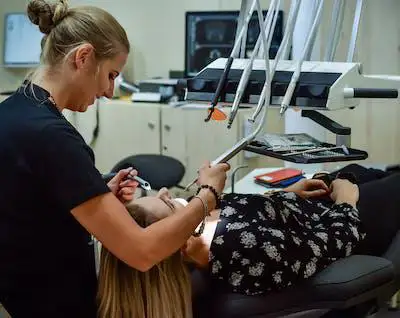Dental anxiety, a spectrum ranging from mild nervousness to paralyzing fear, can have various roots: childhood experiences, past dental trauma, needles, drills, or the perceived loss of control. Whatever the source, neglecting dental care due to fear can worsen oral health, leading to pain, gum disease, and even tooth loss. Fortunately, this cycle can be broken. Here are steps you can take to overcome your dental anxieties and prioritize your oral health:
Finding the Perfect Dental Match:
Seek a dentist specializing in anxious patients. Look for professionals trained in managing dental phobias and offering a calm, gentle approach.
Seek recommendations from friends and family. Ask about positive experiences and dentists known for their patience and understanding.
Interview potential dentists beforehand. Discuss your anxieties openly and gauge their comfort level dealing with nervous patients.
Prioritize communication. Choose a dentist who listens to your concerns, explains procedures clearly, and respects your need for breaks.
Preparing for the Appointment:
Schedule a get-acquainted visit. Discuss your fears and ask questions in a relaxed setting before an actual procedure.
Plan your arrival time strategically. Going first thing in the morning or at a less busy time can reduce waiting room anxiety.
Bring a support person. Having a trusted friend or family member present can offer comfort and emotional support.
Pack distractions. Music, audiobooks, or stress balls can shift your focus away from the dental environment.
Practice relaxation techniques. Deep breathing, meditation, or progressive muscle relaxation can calm your nerves beforehand.
During the Appointment:
Communicate openly. Express your anxieties, pain levels, and need for breaks at any point.
Signal system. Agree on a hand gesture or phrase to pause the procedure if needed.
Focus on control. Grip a stress ball, clench your toes – small actions can empower you amidst apprehension.
Distraction techniques. Immerse yourself in music, audiobooks, or visualize a calming scene.
Pain management options. Discuss pain relief options like anesthesia or sedation dentistry for extensive procedures.
Positive reinforcement. Celebrate small victories, like completing a cleaning or facing a specific fear.
Beyond the Appointment:
Celebrate your progress. Reward yourself for each successful visit, acknowledging your bravery.
Regular maintenance. Schedule regular checkups to prevent anxiety from building up between appointments.
Professional help. If anxieties remain overwhelming, consider seeking therapy to address the root of your fear.
Remember, overcoming dental anxiety is a journey, not a destination. Be patient with yourself, prioritize your comfort, and celebrate each step along the way. With the right mindset, support, and coping mechanisms, you can achieve healthy teeth and conquer your dental demons.
Additional Tips:
Research dental procedures beforehand to familiarize yourself with what to expect.
Consider bringing a written list of questions for your dentist.
Practice self-compassion – setbacks are normal, and progress takes time.
Focus on the long-term benefits of good oral health for your overall well-being.
By taking control of your dental care, you can build confidence, improve your health, and finally, smile without fear.

